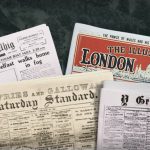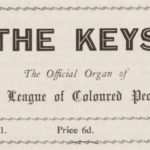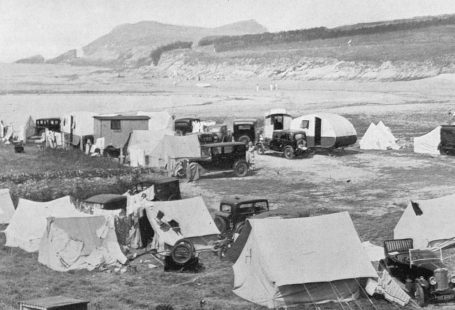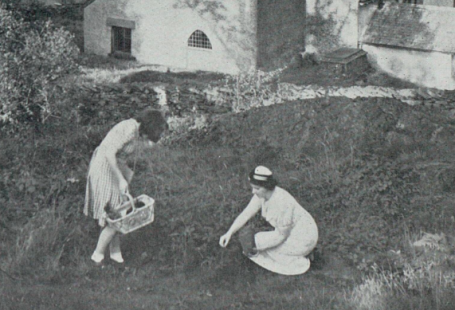On Tuesday, October 24, 1933, between 8 o’clock and 8.10 p.m., Mrs. Violet Kray, wife of Charles Kray, dealer, gave birth to twin boys in their little two-up two-down house in Stean-street, Hoxton…These boys were later to create an empire formed by fear, extortion, protection, torture and finally, murder.
This March 1969 Daily Mirror article of course refers to the Kray twins, Ronnie and Reggie, the most notorious British criminals of the 1960s. Feted by celebrities, chased by authorities, the Kray twins were a compelling mix of glamour and danger which captivated the press of the decade.

And so in this special blog, we will tell the story of the Kray twins in the 1960s through our newspapers, which lapped up the tales of their misdeeds, and made them both two of Britain’s most well-known criminals.
Want to learn more? Register now and explore The Archive
Top tip: to find out more about the Kray twins’ family history, visit our sister site Findmypast, where in a special blog they dive into the background of the powerful East End dynasty. You can read the blog here.
Theatrical Agencies & Apologies
One of the earliest mentions of the famous Kray name in the 1960s came in March 1964, in entertainment industry paper The Stage. In this unlikeliest of places, the elder Kray brother, Charles, states his intention to:
…apply to the London County Council for a Licence to carry on an Employment Agency for the theatrical, variety, concert, cinema artistes at No. 51 Wilton Place, Knightsbridge, S.W.1., such agency to be known as CHARLES KRAY THEATRICAL AGENCY.

There is nothing in this short notice which speaks to the nefarious activities in which Charles and his twin brothers may have been involved at the time. And it seems that Charles Kray had some luck in his venture, as an article in the Daily Mirror, March 1969, recalls. The Kray brothers had opened a club in the East End called the Kentucky Club, and when ‘the film ‘Sparrows Can’t Sing’ was being made in the heart of the Kray manor, ‘The Firm’ supplied some of the extras.’
Skip ahead to September 1964, and this time the Kray name is featured in the national press, namely the Sunday Mirror. And it was now one of the twins who was the focus of this article, and an astonishing apology put forward by the newspaper.
The piece, entitled ‘Mr. Ronald Kray,’ begins by stating:
In the Daily Mirror and the Sunday Mirror during July a number of reports were published suggesting a homosexual relationship between a prominent peer and a man who was described as ‘a leading thug in the London underworld’ and ‘a gangster who leads the biggest protection racket London has ever known.’
And although no names were mentioned by either Mirror publications, ‘other newspapers’ identified the peer as Lord Boothby, and the gangster as Ronnie Kray. With Lord Boothby threatening to sue the Mirror for its allegations, and the Krays threatening the journalists involved, the Sunday Mirror issued this grovelling apology:
We now wish to apologise to Mr. Ronald Kray whom some people identified as the other person concerned, and to state that the allegations contained in our reports were without foundation. We express our regret to Mr. Ronald Kray for the embarrassment and distress our reports caused to him.

And so after this, newspapers were reluctant to write about the Krays and their potential criminality. Indeed, Ronnie later reflected when he was on trial for the murder of George Cornell and Jack ‘The Hat’ McVitie, how the ‘newspapers had been hostile,’ ever since the Boothby piece was published, and then retracted.
Meanwhile, Lord Boothby received an out of court settlement of £40,000, whilst Ronnie Kray, in the dock, attested that he ‘never got any money.’ The Daily Mirror reports his words, in response to his defence lawyer Mr. Platts-Mills:
There was never a foundation for this scandal, and the paper which brought this about apologised in the paper to me.
Menaces & Marriages
But before too long, both Kray twins were again making headlines. The Coventry Evening Telegraph, 7 January 1965, reports how:
The Kray twins – Ronald and Reginald Kray – were at Old Street, London, today remanded in custody until January 15 on a menaces charge.

Whilst Reggie was sanguine about the charges, allegedly remarking ‘All right. It’s one of those things. You’ve got your job to do,’ Ronnie was more militant, allegedly stating:
It’s taken you long enough. You have been after us long enough. This is all down to the Mirror. It was the same with Spotty.
Ronnie must be referencing here the allegations printed by the Mirror, and as for Spotty, well, Spotty was the twins’ old boss. This is also from the Daily Mirror, some years later in March 1969:
…Jack Spot was ‘King of Britain’s Underworld.’ He was the undisputed boss of the East End and the Kray twins went to work for him at race meetings. Their job was to make sure the bookies paid their proper dues to Spot, who controlled the pitches.
Despite an average haul of £5 a day each, the twins had ‘bigger plans in mind.’ The Daily Mirror tells of how they rented ‘an old hut in Eric-street, off the Mile End-road and installed four billiard tables.’ The Krays had a ‘tough reputation’ too, mainly owing to the ‘collection of swords’ they harboured.
Their protection and their nightclub interests continued to grow. After the closure of the Kentucky Club in the East End, the Krays ‘turned their eyes to the West and took over Esmeralda’s Barn in Knightsbridge.’ And it was here that the glamour of these gangsters was cemented, as the Daily Mirror relates:
The club was patronised by members of the House of Lords, the Brigade of Guards, debutantes and prominent business people.
But still, by April 1965 the Krays were not above the law. They faced their second trial for ‘conspiring to demand money with menaces from baronet’s son Hew Cargill McCowan, when he was running a night club in London’s Soho,’ as reports the Daily Mirror. But the case fell apart after the judge, Mr. Justice Lyell, intervened, on the basis that McCowan was the sole witness for the prosecution. The jury decided that they did ‘not wish the case to go on.’

And it was after the collapse of this trial that Reggie Kray stated his intention to marry, as he greeted girlfriend Frances Shea after the trial and said ‘We want to get married this week.’ The Daily Mirror gives this evocative description of the exchange between Reggie and Frances:
As a fawn Jaguar, with the twins inside, drew up outside the house, Miss Shea ran out, embraced Reginald Kray, and said: ‘It’s great to have you back. I love you, darling.’ He said: ‘You’ve been wonderful.’ Then he spoke of wedding plans.

Meanwhile, Ronnie stated: ‘All we want now is a bit of peace and quiet.’
Tatler Tittle-Tattle
But peace and quiet were not to be a luxuries afforded to the Krays. Reggie and Frances married that April, although the union would ultimately end in tragedy with Frances’s suicide just two years later. Meanwhile, however, the Daily Mirror tells of how it was ‘the East End wedding of the year:’
There were telegrams from show-business personalities Lita Roza and actress Barbara Windsor, and cables from Hollywood stars such as actress Judy Garland and singer Billy Daniels.
And then came in November 1965 a profile in society magazine The Tatler, which dubbed the Kray brothers as ‘an East End legend,’ comparing them to Frank and Jesse James. Complete with a glossy photograph of three brothers (Charles was included in the profile), The Tatler gives the following profile of the twins:
They are now less identical than they were in the fabulous days when they could switch raincoats and confuse authority by impersonating each other. Ron is heavy (like the gold ring he wears) and taciturn, with occasional flashes of disconcerting humour. Reg speaks softly and has a slightly worried expression; he seems anxious to please.

Their criminal exploits here are watered down to youthful high-jinks; the writer obviously captivated by the aura of glamour that the Kray brothers were able to project:
To be with them is to enter the atmosphere (laconic, lavish, dangerous) of an early Bogart movie, where life is reduced to the simplest terms and yet remains ambiguous.
But despite this glamour, the Krays were said to be ‘very down to earth,’ at least according to a friend of theirs, a ‘former winner of three Lonsdale Belts:’
‘You might talk nice or might talk East End, but if you’re down to earth you get respect. Everybody respects the Krays.’

And so, the Kray twins at this time seemed to exist in a peculiar no-man’s land, where their criminal undertakings were not mentioned but somehow implied, and most certainly ignored. They were, finally, Britain’s answer to the American gangsters of the 1920s. And perhaps this curious stand-off might have continued, were it not for the events that were to unfold in March 1966.
The Law Catches Up
On 9 March 1966, Ronnie Kray walked into the now infamous Blind Beggar pub in Whitechapel and shot George Cornell, a member of the rival Richardson gang, dead. This was following a shoot-out between the gangs in Catford, which saw one of the Krays’ men killed and many of the Richardsons arrested.
Cornell, after visiting injured members of his gang in hospital, had randomly chosen the Blind Beggar pub to drink at. But the pub was on the Kray’s ‘Manor,’ a fact which resulted in his murder.
However, the next mention of the Krays in our newspapers comes in April 1967, where Crown counsel John Mathew dubbed them as ‘persons of the worst possible character,’ as reports the Daily Mirror. ‘Notorious characters,’ aside from the Cornell murder, with which they had not yet been charged, they had notched up convictions between them for ‘violence, blackmail and bribery.’

And in October 1967, more violence was to follow, with the murder of minor Kray gang member Jack ‘The Hat’ McVitie. Jack had failed to fulfil a contract to the brothers, and he was lured by them to a basement flat in Stoke Newington, where he was stabbed by Reggie whilst Ronnie held him down. Other members of the gang helped to dispose of the body, which was never found.
This incident proved to be a turning point in the Krays’ fortunes, with members of their gang afraid that the same might happen to them. And importantly, some began talking to police. And so, on 8 May 1968, the Krays and fifteen other members of their ‘Firm’ were arrested.
The Belfast Telegraph describes the scene at the Bow Street Court, to which the three Kray brothers had been taken. Scotland Yard had ‘ordered maximum security arrangements,’ whilst ‘the dock was ringed by 30 policemen.’ This is how the newspaper describes Charlie, Reggie and Ronnie:
The three Krays, former boxers, well known for their charitable work in the East End of London, were all described as company directors.

Interestingly, the article does not mention their criminal undertakings, deciding instead to focus on their short-lived boxing careers and their charitable endeavours. The Daily Mirror in March 1969, in an article entitled ‘The Incredible Krays,’ authored by Tom Tullet and Edward Vale, describes their foray into the boxing world:
In 1951 they turned professional boxers and made their debut on their home ground of Mile End. They both won easily. Later all three Kray brothers appeared at the Albert Hall, the twins as lightweights and Charles a welter. Reg was the only winner, on points. Ron was outpointed over six rounds and Charles was knocked out. That was the end of the twin’s efforts at the ‘noble art.’ They found intimidation and bullying an easier method of making money.
And whilst on trial in 1969 for the murders of both Jack ‘The Hat’ McVitie and George Cornell, Ronnie Kray alluded to his charitable work. He professed to have ‘raised £10,000, running promotions, for the old people of Bethnal Green.’ Ronnie, meanwhile, also boldly professed that he was ‘not feared in [his] own borough.’
 Daily Mirror | 31 January 1969
Daily Mirror | 31 January 1969
But the Kray brothers ran their businesses on fear, that was how their operation worked. In October 1968 the Birmingham Daily Post reports on how visits from the Krays left workers ‘scared:’
Employees at a radio station shop, of which Reginald Kray was a director, were ‘obviously scared’ when he visited the premises, one of them said at Bow Street Court yesterday.
And the Krays now were in custody, their empire tumbling down around their ears. They had gone too far with the murder of Jack ‘The Hat’ McVitie, and they were soon to pay for it.
‘It’s Jail for Life’
One of the key witnesses at the twins’ trial was their cousin Ronnie Hart, who had helped hold down Jack ‘The Hat’ McVitie whilst he was murdered. Upon Ronnie Hart’s arrest, he told the police everything. And so when the trial of the twins for murder started in January 1969, his testimony was to be of vital importance.
Hart gave testimony in which he described how Ronnie Kray had asked him to shoot a man named Mr. Shea, as reported in the Coventry Evening Telegraph. When queried by the Krays’ defence lawyer, Mr. Platts-Mills, Ronnie Hart responded:
When Ronald Kray tells you to do something you do it, because if you don’t, you get shot yourself.
Soon it was the turn of the twins to take the stand. On 31 January 1969, George Glenton for the Daily Mirror reported on Ronald Kray’s ‘Crimes and…Good Deeds,’ as he took the stand in his own defence. The article lists Ronnie Kray’s various offences:
His crimes had included taking a car and assaulting the police when he was sixteen, another assault on the police at nineteen, wounding, weapon-carrying, attempted bribery, driving offences and – his last conviction, in 1962 – unlawful gaming.

Meanwhile, in Tullet and Vale’s article for the Daily Mirror some months later, they gave a visceral account of the twins’ early days, describing how they had taken to a life of crime, in an almost Dickensian fashion:
They lived in a labyrinth of dark and dismal streets of tenements blackened with the grime of a century. It was the dormitory of London’s top crooks and the home of poor families trying to make an honest living.
Where others struggled to break out of this corrupting environment, Ronald and Reginald Kray fitted in to it and used it. As boys, they joined the street gangs, fighting, as all East London kids fight, with a built-in instinct for survival.
It seems that the Krays, raised on the streets of the East End, were somehow born bad, a view corroborated by a doctor’s wife from Suffolk, who had housed them when they were evacuated on the outbreak of the Second World War. Mrs Clare Styles, 89, recalled:
My first thought was: what horrid little boys. And so they were. They were full of rough and tumble and quite unlike my own children. I recall vividly how terribly shocked I was to realise that they could not read. I spent long periods teaching them to read.

Ronnie and Reggie didn’t stay long in Hadleigh, and soon returned to the East End ‘while the bombing was still on.’ And it was then that their reign of terror truly began. This is from ‘The Incredible Krays‘ article:
When people tried to walk along the pavements they were pushed into the road. If they complained they were punched. This was violence for fun and they sometimes extorted five or ten shillings from a frightened victim.
Ronnie was arrested when he was sixteen, having assaulted a policeman during a street fight. And then in 1956 Ronnie was given a three year sentence for ‘taking part with two other men in a bayonet attack on a man called Terence Martin.’ When he was arrested, Ronnie was carrying a ‘crowbar, a bayonet, and a loaded revolver,’ and when he was sentenced, the Recorder, Sir Gerald Dodson remarked: ‘You plunged what otherwise is a respectable part of the East End into an abyss of brutality.’
And that abyss was soon to consume them. On 5 March 1969 the Reading Evening Post reported how it was to be ‘jail for life for the Kray twins,’ with a minimum sentence of 30 years recommended by the judge:
Ronald Kray was found guilty yesterday of murdering George Cornell, who was shot in the head at the Blind Beggar public house, East London, in March, 1966, and Jack ‘The Hat’ McVitie at a basement flat in Stoke Newington in October, 1967. Reginald Kray was found guilty of murdering McVitie by stabbing him while Ronald Kray held him.
Meanwhile their brother, Charles Kray, was given a ten year sentence for being an accessory after the murder of Jack McVitie. The presiding judge then famously remarked: ‘In my view society has earned a rest from your activities.’
But in April 1969 the Kray brothers were found ‘not guilty’ of the murder of the ‘Mad Axeman’ Frank Mitchell, as reports the Daily Mirror. They had helped him escape from Dartmoor in 1966, and he was never seen again. ‘There was not enough evidence’, however, against the Krays to convict them.

And then the Kray twins were separated, as Allan Lofts for the Aberdeen Press and Journal reports on 4 July 1969. Ronnie was taken to Durham, where he joined some of the Great Train Robbers as well as, ironically, members of the Richardson gang. Reggie, meanwhile, was taken to Parkhouse Prison on the Isle of Wight. They had both been in custody in Brixton, alongside their brother Charles, who remained there. Given no warning of the move, the twins were allowed a ‘short talk together,’ and with Charles, before being taken:
…in two convoys of Jaguar cars accompanied by motor cycle escorts and travelling at high speed. Scotland Yard Flying Squad officers accompanied them.
The authorities were taking no chances. And nor was the justice system. An appeal on behalf of the Kray brothers and six other men, challenging the double murder conviction, was rejected in July 1969. Lord Justice Widgery expressed his verdict as follows, as reported in the Belfast Telegraph:
This case tells a deplorable story of the activities of a gang in which the accessories sought to cover up the brutal and vicious conduct of the gang leaders…Each [murder] was in cold bold and without obvious motive. Each bore the stamp of a gang leader exercising his authority by killing in the presence of witnesses whose silence was assured in view of that authority.

And that was it for the Krays, although, of course, they continued to both dominate and produce headlines beyond the 1960s. Ronnie was diagnosed with paranoid schizophrenia and was eventually sent to Broadmoor. He died in 1995. Meanwhile, Reggie spent time at various different prisons before being diagnosed with cancer, and was allowed to spend his last days at a hotel in Norwich. He died in 2000, and was buried beside his brother at Chingford Mount cemetery.
Find out about the Krays and other notorious criminals by searching the pages of our Archive here.






